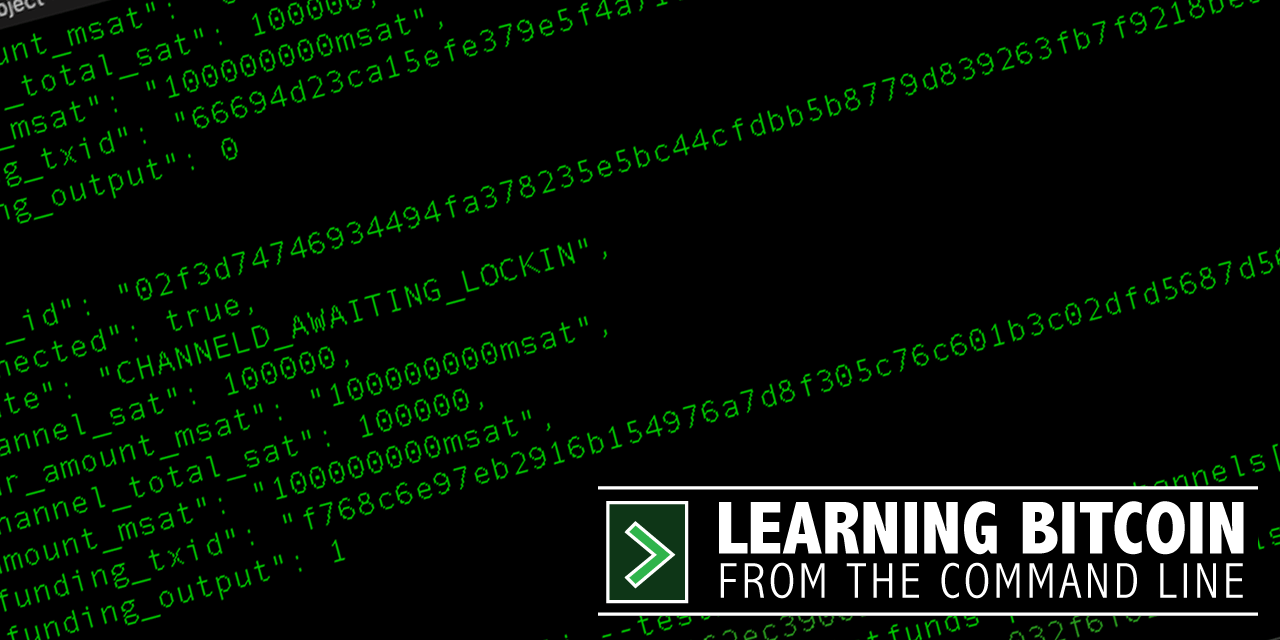Learning Bitcoin from the Command Line is a tutorial for working with Bitcoin (and Lightning) that teaches direct interaction with the servers themselves, as the most robust and secure way to begin cryptocurrency work.
NOTE: This is a draft in progress, so that I can get some feedback from early reviewers. It is not yet ready for use.
This tutorial assumes that you have some minimal background of how to use the command line interface. If not, there are many tutorials available, and I have one for Mac users at https://github.com/ChristopherA/intro-mac-command-line.
- Portuguese — in process
- Spanish - in process
If you'd like to make your own translation, please see Contributing, below.
Status: Finished. Updated for 0.20.
Status: Finished. Updated for 0.20.
- 3.0: Understanding Your Bitcoin Setup
- 4.0: Sending Bitcoin Transactions
- 5.0: Controlling Bitcoin Transactions
- 6.0: Expanding Bitcoin Transactions with Multisigs
- 7.0: Expanding Bitcoin Transactions with PSBTs
- 8.0: Expanding Bitcoin Transactions in Other Ways
Status: Finished. Updated for 0.20 and btcdeb.
- 9.0: Introducing Bitcoin Scripts
- 10.0: Embedding Bitcoin Scripts in P2SH Transactions
- 11.0: Empowering Timelock with Bitcoin Scripts
- 12.0: Expanding Bitcoin Scripts
- 13.0: Designing Real Bitcoin Scripts
Status: Finished.
Status: Finished.
- 16.0: Talking to Bitcoind with C
- 17.0: Programming Bitcoin with Libwally
- 18.0: Talking to Bitcoind with Other Languages
Status: Finished.
Status: Finished.
v2.0.1 of Learning Bitcoin from the Command Line is feature complete. It may still be undergoing third-party review or editing, but it can be used for learning.
We are also tentatively considering what we could include in a v3.0 of the course. If you'd like to support work of that sort, become a GitHub Sponsor or support us at our BTCPay Server, and let us know that Learning Bitcoin was the reason why.
Unless otherwise noted (either in this /README.md or in the file's header comments) the contents of this repository are Copyright © 2020 by Blockchain Commons, LLC, and are licensed under CC-BY.
Learning Bitcoin from the Command Line is a project of Blockchain Commons. We are proudly a "not-for-profit" social benefit corporation committed to open source & open development. Our work is funded entirely by donations and collaborative partnerships with people like you. Every contribution will be spent on building open tools, technologies, and techniques that sustain and advance blockchain and internet security infrastructure and promote an open web.
To financially support further development of $projectname and other projects, please consider becoming a Patron of Blockchain Commons through ongoing monthly patronage as a GitHub Sponsor. You can also support Blockchain Commons with bitcoins at our BTCPay Server.
We encourage public contributions through issues and pull requests! Please review CONTRIBUTING.md for details on our development process. All contributions to this repository require a GPG signed Contributor License Agreement.
if you would like to provide a translation of Learning Bitcoin into another language, please additionally see TRANSLATING.md.
The best place to talk about Blockchain Commons and its projects is in our GitHub Discussions areas.
Blockchain Commons Discussions. For developers, interns, and patrons of Blockchain Commons, please use the discussions area of the Community repo to talk about general Blockchain Commons issues, the intern program, or topics other than the Gordian System or the wallet standards, each of which have their own discussion areas.
As an open-source, open-development community, Blockchain Commons does not have the resources to provide direct support of our projects. Please consider the discussions area as a locale where you might get answers to questions. Alternatively, please use this repository's issues feature. Unfortunately, we can not make any promises on response time.
If your company requires support to use our projects, please feel free to contact us directly about options. We may be able to offer you a contract for support from one of our contributors, or we might be able to point you to another entity who can offer the contractual support that you need.
The following people directly contributed to this repository. You can add your name here by getting involved. The first step is learning how to contribute from our CONTRIBUTING.md documentation.
| Name | Role | Github | GPG Fingerprint | |
|---|---|---|---|---|
| Christopher Allen | Lead Author | @ChristopherA | <ChristopherA@LifeWithAlacrity.com> | FDFE 14A5 4ECB 30FC 5D22 74EF F8D3 6C91 3574 05ED |
| Shannon Appelcline | Lead Author | @shannona | <shannon.appelcline@gmail.com> | 7EC6 B928 606F 27AD |
Additional contributions are listed below:
| Role | Names |
|---|---|
| Contributors: | gg2001 (Go, Node.js sections), gorazdko (Rust section), Javier Vargas (C, Java, Lightning, Tor sections), jodobear (Appendix: Compiling Bitcoin, Python section) |
| Reviewers: | Glen Willem @gwillem |
| Sponsors: | Blockstream Corporation |
We want to keep all of our software safe for everyone. If you have discovered a security vulnerability, we appreciate your help in disclosing it to us in a responsible manner. We are unfortunately not able to offer bug bounties at this time.
We do ask that you offer us good faith and use best efforts not to leak information or harm any user, their data, or our developer community. Please give us a reasonable amount of time to fix the issue before you publish it. Do not defraud our users or us in the process of discovery. We promise not to bring legal action against researchers who point out a problem provided they do their best to follow the these guidelines.
Please report suspected security vulnerabilities in private via email to ChristopherA@BlockchainCommons.com (do not use this email for support). Please do NOT create publicly viewable issues for suspected security vulnerabilities.
The following keys may be used to communicate sensitive information to developers:
| Name | Fingerprint |
|---|---|
| Christopher Allen | FDFE 14A5 4ECB 30FC 5D22 74EF F8D3 6C91 3574 05ED |
You can import a key by running the following command with that individual’s fingerprint: gpg --recv-keys "<fingerprint>" Ensure that you put quotes around fingerprints that contain spaces.
